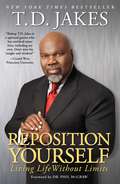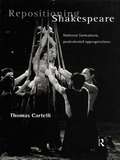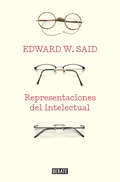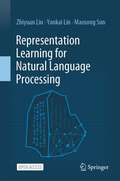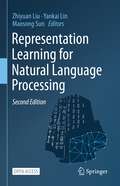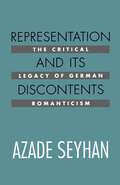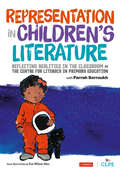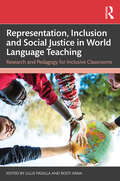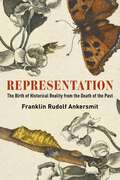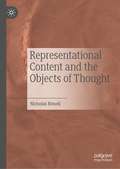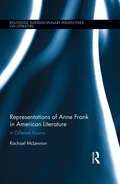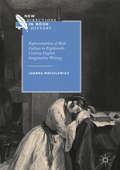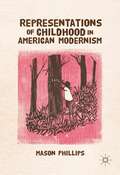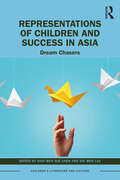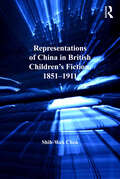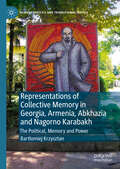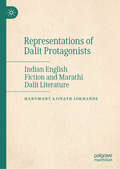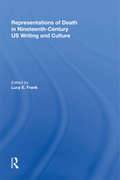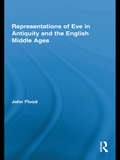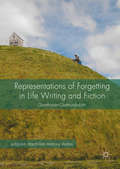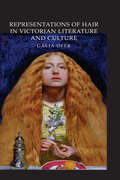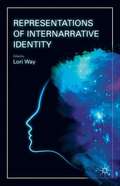- Table View
- List View
Reposition Yourself: Living Life Without Limits
by T.D. JakesLife should be full of success, spirituality, and happy relationships, but we often settle for less—Reposition Yourself is a guide for living a more prosperous life through Christian principles.The star of BET&’s Mind, Body & Soul, and featured guest speaker on Oprah&’s Lifeclass, Potters House pastor T.D. Jakes offers readers the New York Times bestselling Reposition Yourself: Living Life Without Limits, an inspirational narrative self-help book that provides the spiritual underpinnings of his message about applying Christian principles to adjust to the many changes that life brings. In the vein of Joel Osteen&’s Become a Better You and Dr. Phil&’s Life Strategies, Reposition Yourself uses wisdom collected from more than thirty years of Jakes&’s experience counseling and working with high-profile and everyday people on financial, relational, and spiritual creativity on the path to an enriched life filled with contentment at every stage.
Repositioning Shakespeare: National Formations, Postcolonial Appropriations (Routledge Research In Shakespeare And Renaissance Studies #Vol. 2)
by Thomas CartelliRepositioning Shakespeare offers an original assessment of a broad range of texts and cultural events that appropriate Shakespeare. Examining these materials within the context of 'the nation' in a postcolonial era, Thomas Cartelli considers: * essays by Walt Whitman * the nineteenth-century play, 'Jack Cade' * novels by Aphra Behn, Ngugi Wa Thiong'o, Michelle Cliff, Tayeb Salih, Nadine Gordimer and Robert Stone * the 1849 Astor Place Riot Cartelli places particular emphasis on redefining the 'postcolonial' in order to find a place for America. In doing so, Repositioning Shakespeare makes a considerable contribution to the continuing debate about the uses we make of Shakespeare.
Represent and Destroy: Rationalizing Violence in the New Racial Capitalism (Difference Incorporated)
by Jodi MelamedIn the global convulsions in the aftermath of World War II, one dominant world racial order broke apart and a new one emerged. This is the story Jodi Melamed tells in Represent and Destroy, portraying the postwar racial break as a transition from white supremacist modernity to a formally antiracist liberal capitalist modernity in which racial violence works normatively by policing representations of difference. Following the institutionalization of literature as a privileged domain for Americans to get to know difference—to describe, teach, and situate themselves with respect to race—Melamed focuses on literary studies as a cultural technology for transmitting liberal racial orders. She examines official antiracism in the United States and finds that these were key to ratifying the country&’s global ascendancy. She shows how racial liberalism, liberal multiculturalism, and neoliberal multiculturalism made racism appear to be disappearing, even as they incorporated the assumptions of global capitalism into accepted notions of racial equality. Yet Represent and Destroy also recovers an anticapitalist &“race radical&” tradition that provides a materialist opposition to official antiracisms in the postwar United States—a literature that sounds out the violence of liberal racial orders, relinks racial inequality to material conditions, and compels desire for something better than U.S. multiculturalism.
Representaciones del intelectual: Ensayos sobre literatura clásica (Paidos Studio Ser.)
by Edward W. SaidSaid analiza la importancia de la visión ética y la lucha contra la arbitrariedad del poder por parte de los intelectuales. Pocos autores han alcanzado la talla moral e intelectual del profesor Said, cuya figura crece con el paso del tiempo. Respetado incluso por sus detractores, en este libro (seis magistrales conferencias del ciclo Reith, que inició, en 1948, Bertrand Russell) se analiza la importancia de la visión ética y la lucha contra la arbitrariedad del poder por parte de los intelectuales en nuestro tiempo. Said parte de la idea clásica del intelectual como francotirador, perturbador del status quo, un desmitificador obligado a la soledad del juicio ante el empuje de los medios de comunicación que moldean la opinión pública mundial. El intelectual, sostiene el profesor Said, deberá ser el encargado de descubrir esta manipulación. Encuadrados dentro de la sociedad de consumo, los intelectuales son vulnerables a la presión del poder y caen, en numerosas ocasiones, en la banalidad y la falta de sentido crítico. Frente a la cómoda complicidad, la principal misión del intelectual consistirá, a ojos de Edward W. Said -un pensador comprometido con su tiempo-, en defender la independencia de criterio. Esta posición, cuando es real, les llevará a vivir como marginados o, en el peor de los casos -la propia vivencia de Said-, como exiliados.
Representation Learning for Natural Language Processing
by Maosong Sun Zhiyuan Liu Yankai LinThis open access book provides an overview of the recent advances in representation learning theory, algorithms and applications for natural language processing (NLP). It is divided into three parts. Part I presents the representation learning techniques for multiple language entries, including words, phrases, sentences and documents. Part II then introduces the representation techniques for those objects that are closely related to NLP, including entity-based world knowledge, sememe-based linguistic knowledge, networks, and cross-modal entries. Lastly, Part III provides open resource tools for representation learning techniques, and discusses the remaining challenges and future research directions. The theories and algorithms of representation learning presented can also benefit other related domains such as machine learning, social network analysis, semantic Web, information retrieval, data mining and computational biology. This book is intended for advanced undergraduate and graduate students, post-doctoral fellows, researchers, lecturers, and industrial engineers, as well as anyone interested in representation learning and natural language processing.
Representation Learning for Natural Language Processing
by Maosong Sun Zhiyuan Liu Yankai LinThis book provides an overview of the recent advances in representation learning theory, algorithms, and applications for natural language processing (NLP), ranging from word embeddings to pre-trained language models. It is divided into four parts. Part I presents the representation learning techniques for multiple language entries, including words, sentences and documents, as well as pre-training techniques. Part II then introduces the related representation techniques to NLP, including graphs, cross-modal entries, and robustness. Part III then introduces the representation techniques for the knowledge that are closely related to NLP, including entity-based world knowledge, sememe-based linguistic knowledge, legal domain knowledge and biomedical domain knowledge. Lastly, Part IV discusses the remaining challenges and future research directions.The theories and algorithms of representation learning presented can also benefit other related domains such as machine learning, social network analysis, semantic Web, information retrieval, data mining and computational biology. This book is intended for advanced undergraduate and graduate students, post-doctoral fellows, researchers, lecturers, and industrial engineers, as well as anyone interested in representation learning and natural language processing.As compared to the first edition, the second edition (1) provides a more detailed introduction to representation learning in Chapter 1; (2) adds four new chapters to introduce pre-trained language models, robust representation learning, legal knowledge representation learning and biomedical knowledge representation learning; (3) updates recent advances in representation learning in all chapters; and (4) corrects some errors in the first edition. The new contents will be approximately 50%+ compared to the first edition. This is an open access book.
Representation and Its Discontents: The Critical Legacy of German Romanticism
by Azade SeyhanAzade Seyhan provides a concise, elegantly argued introduction to the critical theory of German Romanticism and demonstrates how its approach to the metaphorical and linguistic nature of knowledge is very much alive in contemporary philosophy and literary theory. Her analysis of key thinkers such as Friedrich Schlegel and Novalis explores their views on rhetoric, systematicity, hermeneutics, and cultural interpretation. Seyhan examines German Romanticism as a critical intervention in the debates on representation, which developed in response to the philosophical revolution of German Idealism.Facing a chaotic political and intellectual landscape, the eighteenth-century theorists sought new models of understanding and new objectives for criticism and philosophy. Representation and Its Discontents identifies the legacy of this formative moment in modern criticism and suggests its relevance to contemporary discussions of post-structuralism, orientalism, theories of textuality, and the nature of philosophical discourse.
Representation in Children′s Literature: Reflecting Realities in the classroom
by CLPEThe under-representation of characters of colour in children′s literature in the UK is quantified in the CLPE′s award winning Reflecting Realities research.Through this research, the CLPE actively disrupts the demand-and-supply chain and holds the children′s publishing industry to account, encouraging it to do better. This book: * explores what Reflecting Realities teaches us; * empowers teachers to take positive to ensure classroom libraries are truly representative; * takes time to reflect on the research; * enables teachers to explore what constitutes quality representation; * includes practical support on how to translate this thinking into positive change in the classroom; * provides guidance for curating literature for young readers; * highlights how engagement with inclusive literature positively impacts school reading cultures and wider teaching and learning.
Representation in Children′s Literature: Reflecting Realities in the classroom
by CLPEThe under-representation of characters of colour in children′s literature in the UK is quantified in the CLPE′s award winning Reflecting Realities research.Through this research, the CLPE actively disrupts the demand-and-supply chain and holds the children′s publishing industry to account, encouraging it to do better. This book: * explores what Reflecting Realities teaches us; * empowers teachers to take positive to ensure classroom libraries are truly representative; * takes time to reflect on the research; * enables teachers to explore what constitutes quality representation; * includes practical support on how to translate this thinking into positive change in the classroom; * provides guidance for curating literature for young readers; * highlights how engagement with inclusive literature positively impacts school reading cultures and wider teaching and learning.
Representation, Inclusion and Social Justice in World Language Teaching: Research and Pedagogy for Inclusive Classrooms
by Lillie Padilla Rosti VanaThis volume introduces teaching methodologies for improving and incorporating representation, inclusion and social justice perspectives in the world language curriculum. Chapters present state-of-the-art research and cover many different language contexts, including French, Spanish, Mandarin, and Portuguese. Authors discuss difficult and hot topics, such as Critical Language Awareness, Critical Race Theory, non-binary language use in gendered languages, culturally sustaining curriculum, teaching heritage language speakers, and more. Ideal for graduate courses, students, and scholars in world language education, the volume offers new pathways and strategies for promoting diversity and equity in the classroom.
Representation: The Birth of Historical Reality from the Death of the Past (Columbia Themes in Philosophy)
by Franklin Rudolf AnkersmitWhat makes historical writing distinctive? In Representation, Franklin Rudolf Ankersmit—the preeminent figure in the philosophy of history today—offers a deeply original way of understanding the practice of historical writing and a powerful vindication of history as an empirical discipline. Based on a new reading of the philosophy of G. W. Leibniz, Ankersmit constructs a rigorous framework for understanding the nature of historical argument.Representation argues that while previous states of affairs have left evidence that can be used to formulate true statements, the past itself is irretrievably lost. A condition of historical writing is that the past as such does not exist. Historical texts are best understood as complex signs that mutually criticize one another to compose a historical reality fundamentally distinct from common-sense notions of the past.Representation casts an entirely new light on fundamental concepts such as historical truth, historical debate, and historical rationality. Cogent, forceful, and provocative, this book is the most ambitious work in the philosophy of history in many years.
Representational Content and the Objects of Thought
by Nicholas RimellThis book defends a novel view of mental representation—of how, as thinkers, we represent the world as being. The book serves as a response to two problems in the philosophy of mind. One is the problem of first-personal, or egocentric, belief: how can we have truly first personal beliefs—beliefs in which we think about ourselves as ourselves—given that beliefs are supposed to be attitudes towards propositions and that propositions are supposed to have their truth values independent of a perspective? The other problem is how we can think about nonexistents (e.g., Santa Claus) given the widespread view that thought essentially involves a relation between a thinker and whatever is being thought about. The standard responses to this puzzle are either to deny that thought is essentially relational or to insist that it is possible to stand in relations to nonexistents. This book offers an error theory to the problem. The responses from this book arise from the same commitment: a commitment to treating talk of propositions—as the things towards which our beliefs are attitudes—as talk of entities that actually exist and that play a constitutive and explanatory role in the activity of thought.
Representations of Anne Frank in American Literature: Stories in New Ways (Routledge Interdisciplinary Perspectives on Literature)
by Rachael McLennanThis book explores portrayals of Anne Frank in American literature, where she is often invoked, if problematically, as a means of encouraging readers to think widely about persecution, genocide, and victimisation; often in relation to gender, ethnicity, and race. It shows how literary representations of Anne Frank in America over the past 50 years reflect the continued dominance of the American dramatic adaptations of Frank’s Diary in the 1950s, and argues that authors feel compelled to engage with the problematic elements of these adaptations and their iconic power. At the same time, though, literary representations of Frank are associated with the adaptations; critics often assume that these texts unquestioningly perpetuate the problems with the adaptations. This is not true. This book examines how American authors represent Frank in order to negotiate difficult questions relating to representation of the Holocaust in America, and in order to consider gender, coming of age, and forms of inequality in American culture in various historical moments; and of course, to consider the ways Frank herself is represented in America. This book argues that the most compelling representations of Frank in American literature are alert to their own limitations, and may caution against making Frank a universal symbol of goodness or setting up too easy identifications with her. It will be of great interest to researchers and students of Frank, the Holocaust in American fiction and culture, gender studies, life writing, young adult fiction, and ethics.
Representations of Book Culture in Eighteenth-Century English Imaginative Writing (New Directions in Book History)
by Joanna MaciulewiczThis book is a contribution to the new field of literary studies which is informed by book history and takes interest in the intersection of the ideal and material aspects of literature. It studies the ways eighteenth-century English novels, plays and poems illustrated the changes which the growth of literacy, the proliferation of writing and the emergence of print marketplace made in the social and cultural life of Britain and demonstrated the contingency of the emerging criticism on the technological and economic conditions of book production. The first part focusses on the representation of the tensions created by the emergence of literate society and on the hopes and fears awoken by the expansion of the cultural public sphere caused by the proliferation of print. The second part explores the contribution of literature to the shaping of the roles of authors, readers and patrons in the field of literary production.
Representations of Childhood in American Modernism
by Mason PhillipsThis book documents American modernism’s efforts to disenchant adult and child readers alike of the essentialist view of childhood as redemptive, originary, and universal. For James, Barnes, Du Bois, and Stein, the twentieth century’s move to position the child at the center of the self and society raised concerns about the shrinking value of maturity and prompted a critical response that imagined childhood and children’s narratives in ways virtually antagonistic to both. In this original study, Mason Phillips argues that American modernism’s widespread critique of childhood led to some of the period’s most meaningful and most misunderstood experiments with interiority, narration, and children’s literature.
Representations of Childhood in American Modernism
by Michelle H. PhillipsThis book documents American modernism's efforts to disenchant adult and child readers alike of the essentialist view of childhood as redemptive, originary, and universal. For James, Barnes, Du Bois, and Stein, the twentieth century's move to position the child at the center of the self and society raised concerns about the shrinking value of maturity and prompted a critical response that imagined childhood and children's narratives in ways virtually antagonistic to both. In this original study, Michelle H. Phillips argues that American modernism's widespread critique of childhood led to some of the period's most meaningful and most misunderstood experiments with interiority, narration, and children's literature.
Representations of Children and Success in Asia: Dream Chasers (Children's Literature and Culture)
by Sue Chen, Shih-Wen and Wen Lau, SinThis edited volume explores how success is conceptualized and represented in texts for young people in Asia. The essays in this collection examine how success for children relates to education, family, gender, race, class, community, and the nation. It answers the following questions: How is success for children represented in literature, cinema, and popular media? In what ways are these images grounded in the historical, political, and cultural contexts in which they are produced and consumed? How does childhood agency influence ideas about success in Asia? Highlighting the similarities and differences in how success is defined for children and young adults in Japan, South Korea, People’s Republic of China, Singapore, Taiwan, Indonesia, Vietnam, and India, this volume argues that success is an important keyword in the literary and cultural study of childhood in Asia.
Representations of China in British Children's Fiction, 1851-1911 (Studies in Childhood, 1700 to the Present)
by Shih-Wen ChenIn her extensively researched exploration of China in British children’s literature, Shih-Wen Chen provides a sustained critique of the reductive dichotomies that have limited insight into the cultural and educative role these fictions played in disseminating ideas and knowledge about China. Chen considers a range of different genres and types of publication-travelogue storybooks, historical novels, adventure stories, and periodicals-to demonstrate the diversity of images of China in the Victorian and Edwardian imagination. Turning a critical eye on popular and prolific writers such as Anne Bowman, William Dalton, Edwin Harcourt Burrage, Bessie Marchant, G.A. Henty, and Charles Gilson, Chen shows how Sino-British relations were influential in the representation of China in children’s literature, challenges the notion that nineteenth-century children’s literature simply parroted the dominant ideologies of the age, and offers insights into how attitudes towards children’s relationship with knowledge changed over the course of the century. Her book provides a fresh context for understanding how China was constructed in the period from 1851 to 1911 and sheds light on British cultural history and the history and uses of children’s literature.
Representations of Collective Memory in Georgia, Armenia, Abkhazia and Nagorno Karabakh: The Political, Memory and Power (Memory Politics and Transitional Justice)
by Bartłomiej KrzysztanThe book is a unique proposal for an integral description of memory regimes in the South Caucasus region, covering both the independent states of Armenia and Georgia, but also the separatist entities created as a result of the turbulent changes of the early 1990s - Abkhazia and Nagorno-Karabakh. Being a transdisciplinary proposal, encompassing the perspectives of political science, history and social anthropology, the book may be of interest to researchers from different academic disciplines. At the same time, due to its narrative form, it can also be an interesting proposal for students of eastern studies, allowing for a fuller understanding of the dynamics of political change in the post-Soviet space. The comprehensive and integral approach to the issue of analysing and interpreting collective memory through the prism of its representation, presented in the form of an anthropological story based on case studies, may also be of interest to those not associated with institutional Academia.
Representations of Dalit Protagonists: Indian English Fiction and Marathi Dalit Literature
by Hanumant Ajinath LokhandeThis book interrogates canonical Indian English fiction which has Dalit characters as protagonists or major characters, and argues that the representation of such characters, although well-meant, is regulated and made unremarkable. It examines how the normative discourse of the Anglophone novel portrays Dalits from an upper-caste point of view, devoid of Ambedkarite or Dalit consciousness, and thus implicitly reinscribes the upper caste power by restricting the narrative to merely represent Dalit submission and victimhood. The arguments then are substantiated by setting up a comparative framework through contrastive analysis of selected narratives by Dalit writers from Marathi Dalit literature to highlight the differential representational paradigms that mark the absence or presence of Ambedkarite consciousness and perspective.
Representations of Death in Nineteenth-Century US Writing and Culture (Warwick Studies In The Humanities Ser.)
by Lucy E. FrankFrom the famous deathbed scene of Harriet Beecher Stowe's Little Eva to Mark Twain's parodically morbid poetess Emmeline Grangerford, a preoccupation with human finitude informs the texture of nineteenth-century US writing. This collection traces the vicissitudes of this cultural preoccupation with the subject of death and examines how mortality served paradoxically as a site on which identity and subjectivity were productively rethought. Contributors from North America and the United Kingdom, representing the fields of literature, theatre history, and American studies, analyze the sexual, social, and epistemological boundaries implicit in nineteenth-century America's obsession with death, while also seeking to give a voice to the strategies by which these boundaries were interrogated and displaced. Topics include race- and gender-based investigations into the textual representation of death, imaginative constructions and re-constructions of social practice with regard to loss and memorialisation, and literary re-conceptualisations of death forced by personal and national trauma.
Representations of Eve in Antiquity and the English Middle Ages (Routledge Studies in Medieval Religion and Culture)
by John FloodAs the first woman, Eve was the pattern for all her daughters. The importance of readings of Eve for understanding how women were viewed at various times is a critical commonplace, but one which has been only narrowly investigated. This book systematically explores the different ways in which Eve was understood by Christians in antiquity and in the English Middle Ages, and it relates these understandings to female social roles. The result is an Eve more various than she is often depicted by scholars. Beginning with material from the bible, the Church Fathers and Jewish sources, the book goes on to look at a broad selection of medieval writing, including theological works and literary texts in Old and Middle English. In addition to dealing with famous authors such as Augustine, Aquinas, Dante and Chaucer, the writings of authors who are now less well-known, but who were influential in their time, are explored. The book allows readers to trace the continuities and discontinuities in the way Eve was portrayed over a millennium and a half, and as such it is of interest to those interested in women or the bible in the Middle Ages.
Representations of Forgetting in Life Writing and Fiction
by Gunnthorunn GudmundsdottirThis book primarily focuses on the concept of forgetting, with particular emphasis on how we can trace the forgotten in contemporary life writing and memory texts. It consists of two main parts: the first concentrates on life writing in particular and what the author calls "scenes of forgetting"; the second examines both fiction and autobiographies that deal with questions of collective memory/forgetting. The book's principal aim is to map methods and strategies writers employ when writing the forgotten - it argues that forgetting is a constant companion in any memory text and plays a decisive role in the memory work performed in the texts. The main theoretical objective is to examine carefully the connection between collective memory and personal memory, by drawing from two disciplines at once: memory studies and theories on life writing. By considering both areas of research, the conclusions of this study are able to feed into both theoretical perspectives.
Representations of Hair in Victorian Literature and Culture
by Galia OfekGalia Ofek's wide-ranging study elucidates the historical, artistic, literary, and theoretical meanings of the Victorians' preoccupation with hair. Victorian writers and artists, Ofek argues, had a well-developed awareness of fetishism as an overinvestment of value in a specific body part and were fully cognizant of hair's symbolic resonance and its value as an object of commerce. In particular, they were increasingly alert to the symbolic significance of hairstyling. Among the writers and artists Ofek considers are Elizabeth Gaskell, George Eliot, Margaret Oliphant, Charles Darwin, Anthony Trollope, Elizabeth Barrett Browning, Eliza Lynn Linton, Mary Elizabeth Braddon, Herbert Spencer, Dante Gabriel Rossetti, Edward Burne-Jones, Charles Dickens, Thomas Hardy, and Aubrey Beardsley. By examining fiction, poetry, anthropological and scientific works, newspaper reviews and advertisements, correspondence, jewellery, paintings, and cartoons, Ofek shows how changing patterns of power relations between women and patriarchy are rendered anew when viewed through the lens of Victorian hair codes and imagery during the second half of the nineteenth century.
Representations of Internarrative Identity
by Lori WayBased upon Ajit Maan's groundbreaking theory of Internarrative Identity, this collection focuses upon redefining self, slave narrative, the black Caribbean diaspora, and cyberspace to explore the interconnection between identity and life experience as expressed through personal narrative.
